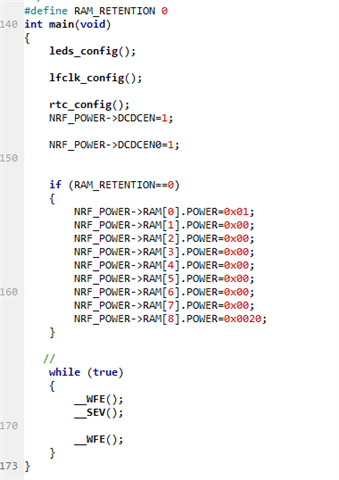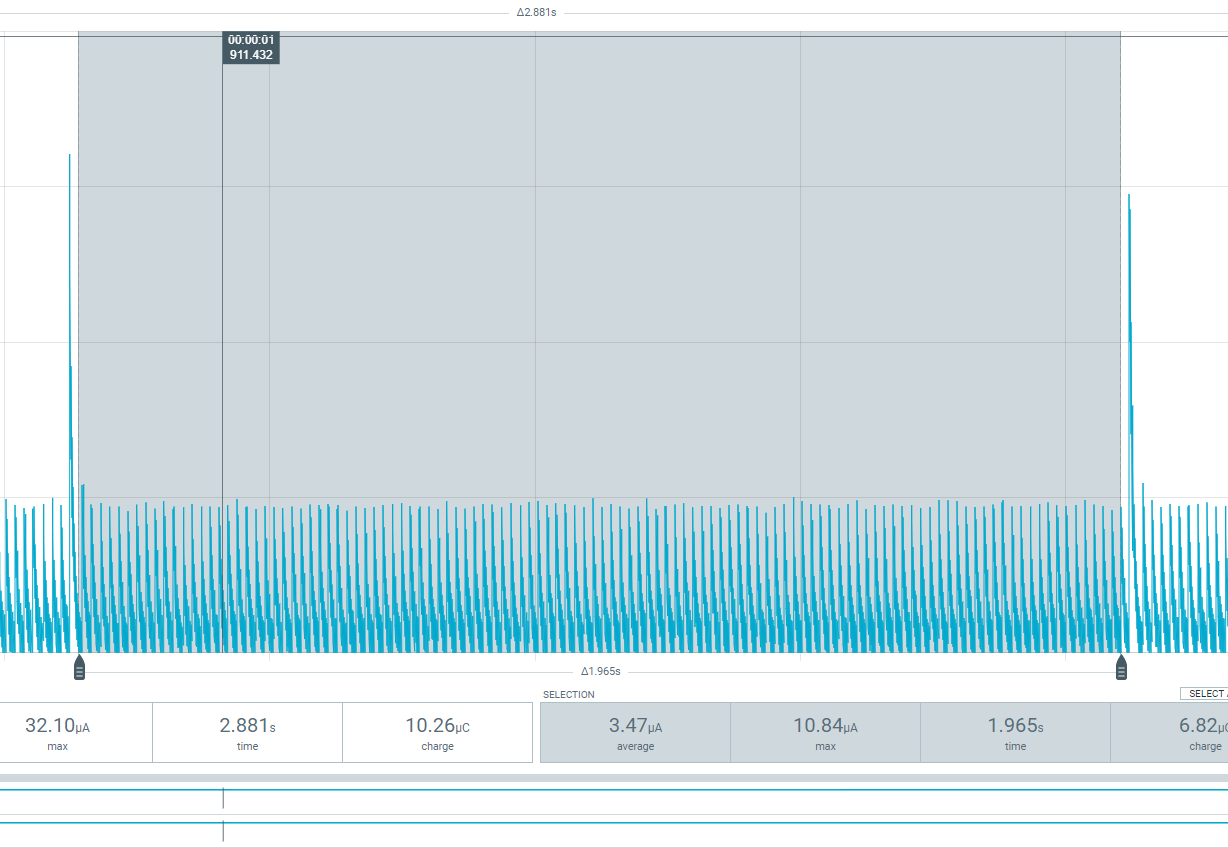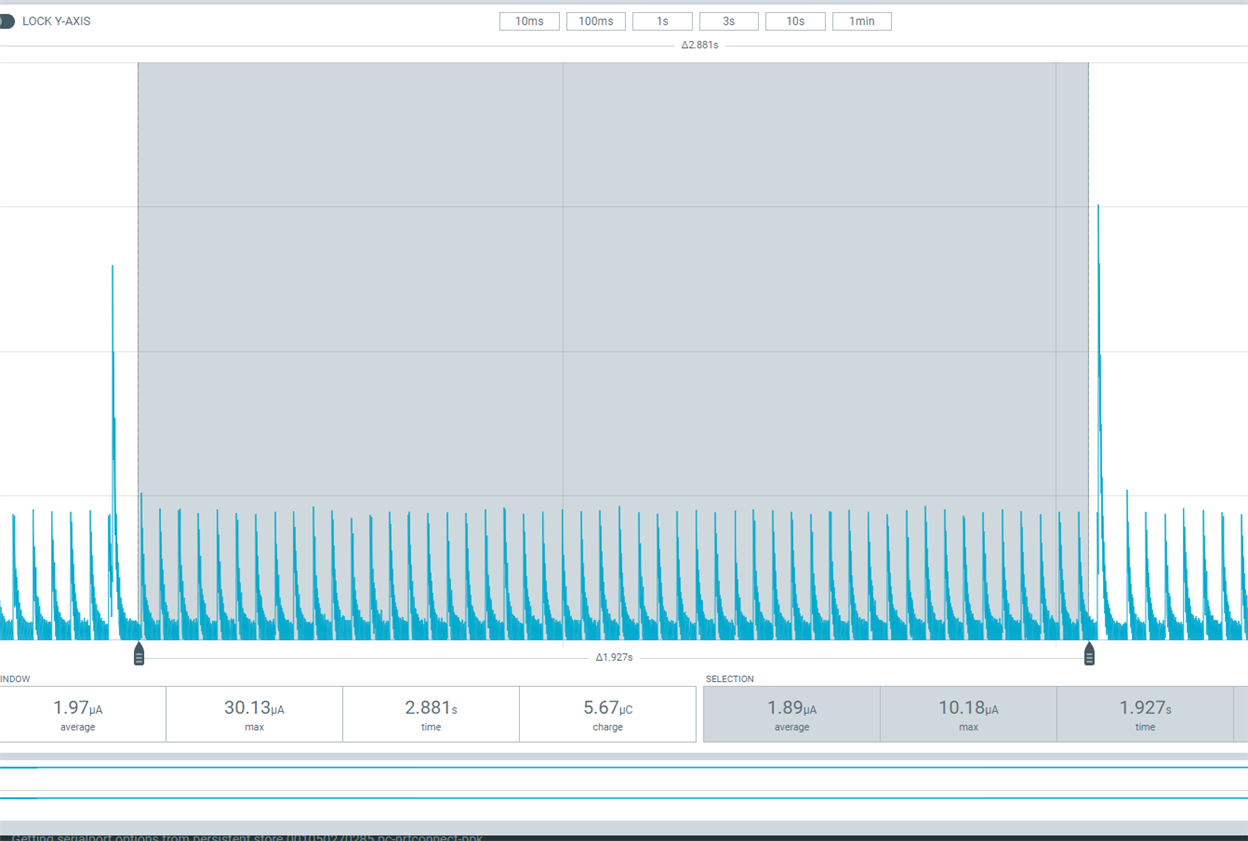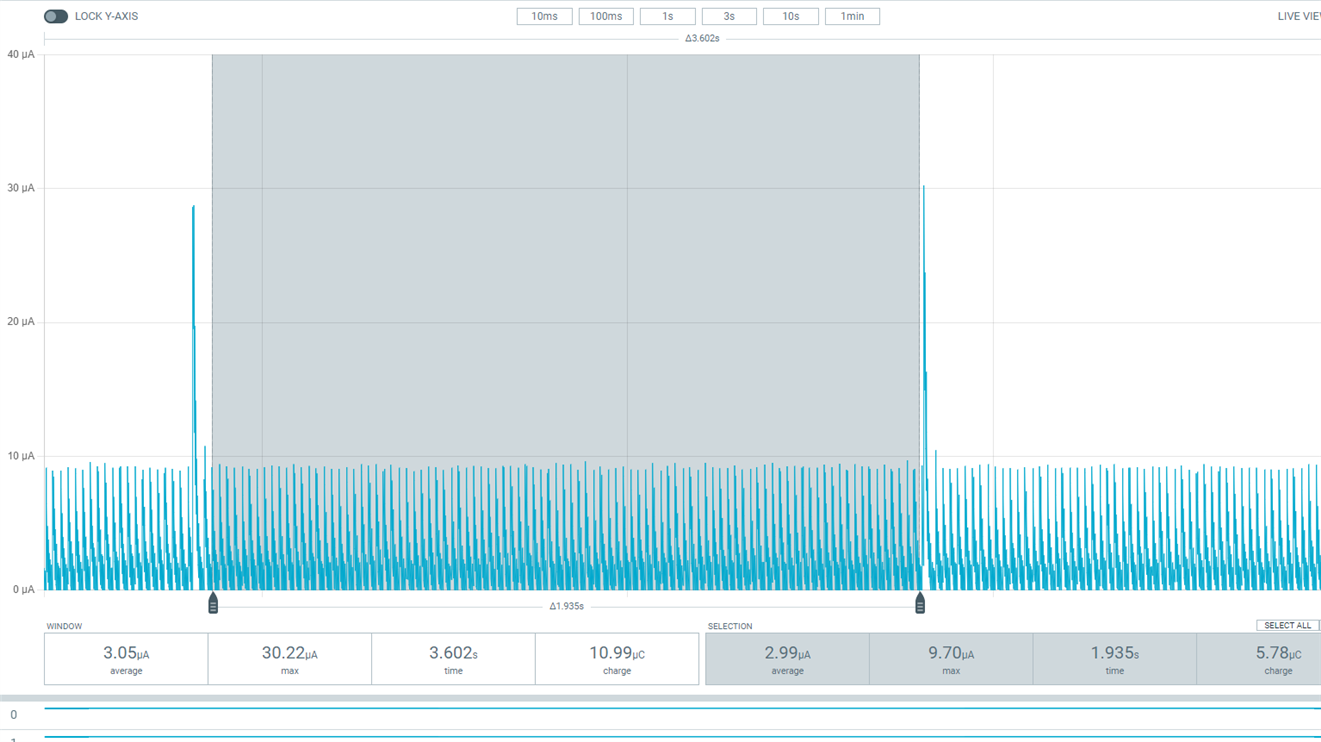I need to wake up the nrf52840 every 250ms so I am using the system on sleep mode and the RTC. I have only a few dozen bytes that I need to have persist between each wake up. I want to turn off all but one block of RAM for maximum power efficiency and store the bytes there. I have modified the Ram Retention example in SDK17 using Segger to turn off all but one block but I am not getting lower power consumption. In fact, the lowest power consumption is full, followed by partial, and then none. I measured 3.06uA with no RAM retention, 3.00uA with partial, and 2.94uA with full using the PPK2. Is there anything else that needs to be done in order to turn off unused RAM blocks? Are there any other peripherals that I need to be aware of? I have attached the modified ram retention code.
int main(void)
{
uint32_t * volatile p_ram_test = (uint32_t *)RAM_MEMORY_TEST_ADDRESS;
uint32_t loop_count = 0;
bsp_board_init(BSP_INIT_LEDS);
APP_ERROR_CHECK(NRF_LOG_INIT(NULL));
NRF_LOG_DEFAULT_BACKENDS_INIT();
// This pin is used for waking up from System OFF and is active low, enabling sense capabilities.
nrf_gpio_cfg_sense_input(PIN_GPIO_WAKEUP, BUTTON_PULL, NRF_GPIO_PIN_SENSE_LOW);
// Workaround for PAN_028 rev1.1 anomaly 22 - System: Issues with disable System OFF mechanism
nrf_delay_ms(1);
// Check if the system woke up from System IDLE mode by reading the NRF_POWER->GPREGRET register which has
// retained the value written before going to System IDLE. Below is the layout for usage for
// NRF_POWER->GPREGRET register.
// BITS | 7 | 6 | 5 | 4 | 3 | 2 | 1 | 0
// --------------------------------------------------------------------
// | SPECIAL_SEQUENCE | LOOP_COUNT
// --------------------------------------------------------------------
///
if ((NRF_POWER->GPREGRET >> 4) == RESET_MEMORY_TEST_BYTE)
{
// Take the loop_count value.
loop_count = (uint8_t)(NRF_POWER->GPREGRET & 0xFUL);
NRF_POWER->GPREGRET = 0;
if (loop_count >= (uint8_t)MAX_TEST_ITERATIONS)
{
// clear GPREGRET register before exit.
NRF_POWER->GPREGRET = 0;
bsp_board_led_on(SUCCESS_PIN_NUMBER);
while (true)
{
// Do nothing.
}
}
if (*p_ram_test != RAM_MEMORY_TEST_WORD)
{
display_failure();
}
*p_ram_test = 0;
}
// Write the known sequence + loop_count to the GPREGRET register.
loop_count++;
NRF_POWER->GPREGRET = ( (RESET_MEMORY_TEST_BYTE << 4) | loop_count);
// Write the known value to the known address in RAM, enable RAM retention, set System Sleep, and wait
// for GPIO wakeup from external source.
bsp_board_led_on(READY_PIN_NUMBER);
nrf_delay_ms(1000);
//Turn off everything but a single RAM bank for minimum current draw.
NRF_POWER->RAM[0].POWERSET = (POWER_RAM_POWER_S0POWER_On << POWER_RAM_POWER_S0POWER_Pos) |
(POWER_RAM_POWER_S1POWER_Off << POWER_RAM_POWER_S1POWER_Pos) |
(POWER_RAM_POWER_S2POWER_Off << POWER_RAM_POWER_S2POWER_Pos) |
(POWER_RAM_POWER_S3POWER_Off << POWER_RAM_POWER_S3POWER_Pos) |
(POWER_RAM_POWER_S4POWER_Off << POWER_RAM_POWER_S4POWER_Pos) |
(POWER_RAM_POWER_S5POWER_Off << POWER_RAM_POWER_S5POWER_Pos) |
(POWER_RAM_POWER_S6POWER_Off << POWER_RAM_POWER_S6POWER_Pos) |
(POWER_RAM_POWER_S7POWER_Off << POWER_RAM_POWER_S7POWER_Pos) |
(POWER_RAM_POWER_S8POWER_Off << POWER_RAM_POWER_S8POWER_Pos) |
(POWER_RAM_POWER_S9POWER_Off << POWER_RAM_POWER_S9POWER_Pos) |
(POWER_RAM_POWER_S10POWER_Off << POWER_RAM_POWER_S10POWER_Pos) |
(POWER_RAM_POWER_S11POWER_Off << POWER_RAM_POWER_S11POWER_Pos) |
(POWER_RAM_POWER_S12POWER_Off << POWER_RAM_POWER_S12POWER_Pos) |
(POWER_RAM_POWER_S13POWER_Off << POWER_RAM_POWER_S13POWER_Pos) |
(POWER_RAM_POWER_S14POWER_Off << POWER_RAM_POWER_S14POWER_Pos) |
(POWER_RAM_POWER_S15POWER_Off << POWER_RAM_POWER_S15POWER_Pos) |
(POWER_RAM_POWER_S0RETENTION_On << POWER_RAM_POWER_S0RETENTION_Pos) |
(POWER_RAM_POWER_S1RETENTION_Off << POWER_RAM_POWER_S1RETENTION_Pos) |
(POWER_RAM_POWER_S2RETENTION_Off << POWER_RAM_POWER_S2RETENTION_Pos) |
(POWER_RAM_POWER_S3RETENTION_Off << POWER_RAM_POWER_S3RETENTION_Pos) |
(POWER_RAM_POWER_S4RETENTION_Off << POWER_RAM_POWER_S4RETENTION_Pos) |
(POWER_RAM_POWER_S5RETENTION_Off << POWER_RAM_POWER_S5RETENTION_Pos) |
(POWER_RAM_POWER_S6RETENTION_Off << POWER_RAM_POWER_S6RETENTION_Pos) |
(POWER_RAM_POWER_S7RETENTION_Off << POWER_RAM_POWER_S7RETENTION_Pos) |
(POWER_RAM_POWER_S8RETENTION_Off << POWER_RAM_POWER_S8RETENTION_Pos) |
(POWER_RAM_POWER_S9RETENTION_Off << POWER_RAM_POWER_S9RETENTION_Pos) |
(POWER_RAM_POWER_S10RETENTION_Off << POWER_RAM_POWER_S10RETENTION_Pos) |
(POWER_RAM_POWER_S11RETENTION_Off << POWER_RAM_POWER_S11RETENTION_Pos) |
(POWER_RAM_POWER_S12RETENTION_Off << POWER_RAM_POWER_S12RETENTION_Pos) |
(POWER_RAM_POWER_S13RETENTION_Off << POWER_RAM_POWER_S13RETENTION_Pos) |
(POWER_RAM_POWER_S14RETENTION_Off << POWER_RAM_POWER_S14RETENTION_Pos) |
(POWER_RAM_POWER_S15RETENTION_Off << POWER_RAM_POWER_S15RETENTION_Pos);
// Write test word to RAM memory.
*p_ram_test = RAM_MEMORY_TEST_WORD;
bsp_board_leds_off();
//Enter System Idle sleep with partial Ram Retention.
while (true)
{
__WFE();
}
}






